Bhagavatam Bites – SB 3.27.1
→ Dandavats
Read More...
Websites from the ISKCON Universe
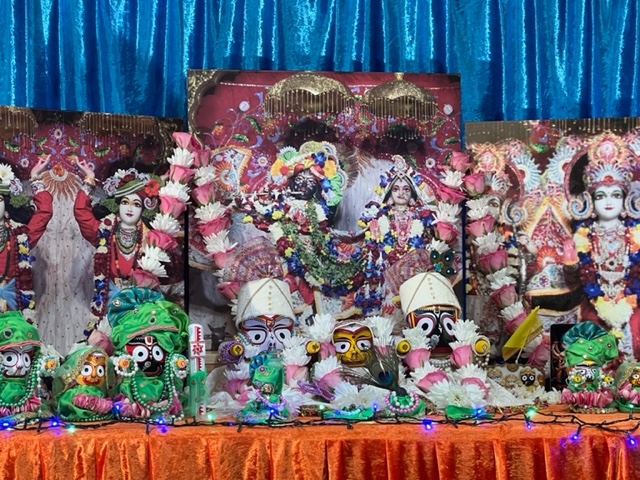

In the greater Sydney area there are many Bhakti Vrksa and Nama Hatta programs amongst the devotee community. Every month one group, in the Glenfield area, has a program in the community centre there.
Venu Vadak prabhu, who is one of the leaders, invited me to their Rathayatra festival that was being observed indoors at the centre. Some months before a small altar for Their Lordships, Jagannatha, Baladeva and Subhadra was purchased from our devotees in Ujjain India. It was fixed on a wheeled base and the devotees pulled Their lordships around the hall with ecstatic kirtan.
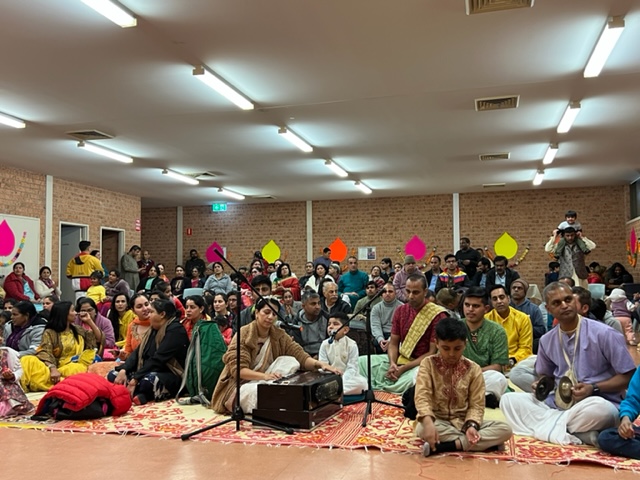
Toronto/Gananoque
As Always, A Good Day
Being summertime means that guests are coming, both spiritual seekers and spiritual speakers. A very humble and scholarly monk (brahmacari) from Orissa, India, is delivering classes on bhakti and that is bringing attention to morning and evening programs. It’s interesting to see numbers have come back during the post-pandemic period.
From Gainesville came a senior Vaishnava lady, also scholarly, Prabhupada Priya, who delivered a class today from the Bhagavatam, discussing the lack of fulfillment on the part of the sage, Vyasa, compiler of the Vedas. His time with guru, Narada, allowed Vyasa to see his shortcoming in his writing. More emphasis on devotion was the urge from Narada.
We all need urging or nudging in our devotional endeavours. This morning I was encouraged to clean. For where there is consistent dirt, I will put on my work clothes and get to mopping. I recall meeting a man in the Midwest of the U.S. during my walk. He was in his seventies, loading wood he had cut for fuel. With pride he said, “I don’t have to go to the gym.”
That’s the way I feel when taking the mop, bucket, water and soap to tackle the floors. It’s a pleasant workout for me and I get to dance with that mop moving over the floor. My philosophy is that with the traffic we get at the temple and ashram, cleaning needs doing everyday.
The Bhakti Academy members have taken on as an engagement forming my drama production for the play, “Demon.” The performance is held in Montreal this weekend so the troupe and I left for the city while making a meaningful stop at Gananoque Inn with proprietors, the Patels. They fed us at the midway point, a gorgeous spot off the St. Lawrence River.
May the Source be with you!
St. Jamestown, Toronto
Save the Earth/Sage the Earth
My last draft on this poem.
She goes by a sweet Vedic name, Bhoomi
And is worshipped by many a sage and muni
She’s sometimes described as a sacred cow or calf
A sentient being who can cry or can laugh
Speaking of none other than this planet, the globe, the giver
She’s our mother, our sustainer, our deliverer
Her glories are told in ancient folklore verses
She likes the massage when we walk on her surface
Mother Earth is revered but she has been ravaged
We treat her as though we are selfish and savage
She can be hard, but also tender and fragile
Deserving attention and a break from the hostile
It is innate sensitivity that we must awaken
To the spill of rubbish that she has taken
We must own up to our vile deviation
Offer protection and end her frustration
Let us endorse “Those who give are those who love”
A sentiment arising from the heart and sent from above
This is the spirit of both the Earth and the sage
It is a practical course in which we should engage
- Composed by Bhaktimarga Swami, The Walking Monk
May the Source be with you!
3 km
Yonge St., Toronto
Curiosity at Sam’s
The two lads, middle-aged, were sitting on the steps at Toronto Metropolitan University, at the former sight of the iconic “Sam the Record Man” on south Yonge St. The one more hefty-built one waved me over and had oodles of questions.
“I’ve been with some beautiful women and also some not so beautiful. Some were great people. Some were just demons. Could you comment?”
“We live in a world of duality – good and bad. Life teaches us to keep an even-mindedness in all circumstances and at the same time we should choose our best company that is most favorable.”
“Good enough. Can you give me some lesson to live with?” He continued.
“Certainly. Let’s get our identity right. We are not flesh. We are not these bodies. We are, in essence, spirits and we are here to serve others as spirits. Our purpose is to look after each other.”
“How long have you been a monk with Krishna?” asked the second fellow.
“I joined when I was twenty, a mere forty-nine years ago. I joined the ashram when we were on Gerrard St. in the Cabbagetown section. There were days when, as part of my service, I would come right to this spot when the famous music store was here. I would be accompanied by another monk and we would approach pedestrians and try to interest them in the teachings of the Bhagavad-gita. At times, I met Sam, the Record Man. He was nice.”
Our conversation went on for a bit until my walking partner, Vallabha, met me after being lost. It was great meeting those guys that were supportive and had questions – questions of what I just gave a sampling. I left them with a gift.
May the Source be with you!
7 km
Christie Pits, Toronto
Karma Came Up
“Better to suffer than to protest,” is rather a mind-blowing remark when taken out of context. In the Gita,12.13-14, an insightful purport had us probing into the nature of karmawith these above-mentioned, profound words. At this morning’s class, I shared these words expressing the token of pain that a spiritual practitioner encounters against the massive load that one deserves to face on a normal basis.
Our group of monks and a few visitors sat with rapt attention at the exploration of the laws of action and reaction. One expression by our dear Prabhupada came when he taught that we should never curse the agent of karma or, as the saying goes, to never hold blame to the messenger by killing him. In general terms, each and every one of us are to blame for our own inappropriate actions and we should, if anything, be kind to the delivery boy. He/she is not responsible. We are.
By evening, I hankered for a time for more contemplation on receiving what we deserve. It was at that moment, on Bloor St, near the new development where Honest Ed’s Warehouse had stood for decades, that a young fellow approached me. “I saw you on the other side of Bloor. I thought to come over. Can you answer some questions?”
Naturally I said, “sure,” and we walked for blocks and blocks speaking of karma, ego, atma, etc. His name was Zerus, and was born in Burma. Our end conclusion for the night is we all have to work at getting clear, demolishing vices, and getting in good with God.
May the Source be with you!
6 km
Toronto, ON
Share Your Care
I know you all feel like you want to help with what's going on in Ukraine. Our Hare Krishna movement has an ISKCON temple in Lviv, Ukraine currently serving as a refugee centre. I want to share with you some information so that you can get involved in this important support program. Below is content taken from Share Your Care regarding Ukrainian Krishna devotees needing our help in Lviv. I will include the link to the site at the bottom of this entry for more information.
"Both Share Your Care team and Lviv Yatra are extremely grateful to ISKCON Canada for adopting the Lviv Yatra.
The Lviv yatra has played a unique role for Ukrainian devotees. Located on the western border of Ukraine, it hosted hundreds of devotees who were forced to flee their homes in the north, east and south of the country. This yatra provided emergency care to Vaisnavas. It did it especially in the first weeks of the war when there was a massive influx of Ukrainian citizens crossing the border with Poland. It was cold and people had sometimes been traveling for several days before reaching Lviv. The Vaisnavas launched a grand-scale Food For Life program. 200,000 portions of prasadam have been distributed to those in need. To this day, the FFL team is still rendering this service. They go to cities which are being shelled.
Despite the fact that the Lviv temple is under construction, it hosts 35-50 devotees. So far Share Your Care fund has been transferring USD 2000 to the yatra monthly. It has been enough to cover monthly bhoga and utility bills. You can find Vasuttama Prabhu’s report about Lviv yatra in this inspiring video: https://www.youtube.com/watch?v=vd5q7P3deaM
We encourage you to share your care with this wonderful yatra. We will help you to communicate with the devotees directly. You will be able to get to know their needs first hand and share the joy of serving Srila Prabhupada’s mission with them.”
May the Source be with you.
https://shareyour.care/donations/become-a-patron-for-lviv-yatra/
Stratford, Caledon/Ontario
With the Younger Gen
Today we drove to the lovely city of Stratford, home of many theatrical productions. However, the group I’m with, the Bhakti Academy, and the group we were joining, the Bhakti Yoga Club leaders really had set to participate in workshops that had nothing to do with live theatre.
My role in this weekend-long program, held at Quality Inn, was to facilitate the two bhaktiyouth-groups in a “Nine Devotions Workshop,” something I’ve executed in the past and which is still appreciated. These nine actions in Krishna Consciousness are vital in keeping practitioners in a steady and more firm hold on the life of bhakti. We began the workshop with the exercise of listening intently. Gabriel began with the guitar, so that’s what we first heard. His strumming on his guitar set the tone and the tune for the maha(or great) mantra. The response to the tune by all the others after my lead was reflective, and I believe it ended up stirring up the introspection that we were looking for. Indeed, attention was on the sound, which is not ordinary, sorry. Our teachers and our ancient Vedic texts tell that the sound is holy and that it’s God directly.
The remaining seven devotions were also interactive; everyone kept quite alive for the session, held in the morning.
By the afternoon, we found ourselves in Caledon, a town in gorgeous rolling hills, and also known for its monster homes. The unique location where we landed, both groups, was at the home of Vishal and Yashomati. They keep gir cows from India on their farm. They, the couple, and the cows are a charm.
May the Source be with you!
5 km
The assembly and installation of the new TOVP flagpole was finally completed! It is made of high strength combined stainless steel pipe and is 9m (30 ft) high. A TOVP flag is fixed on it and an aviation light and lightning arrestor are placed at the highest point.
Assembly and installation of this structure at a height of more than 100m (330ft) on the main dome Chakra was not an easy task. But, thanks to the efforts of TOVP devotees and professional specialists from Kolkata, the task was completed.
After installing the light sensor, at nightfall a red signal light will automatically turn on over the main Chakra, and during the rainy season, the TOVP building will be protected from lightning strikes by the lightning arrestor. It is located 5m (17ft) above the Chakra, so the height of the TOVP has increased by another 5m (17ft) and is now about 118m (390ft).
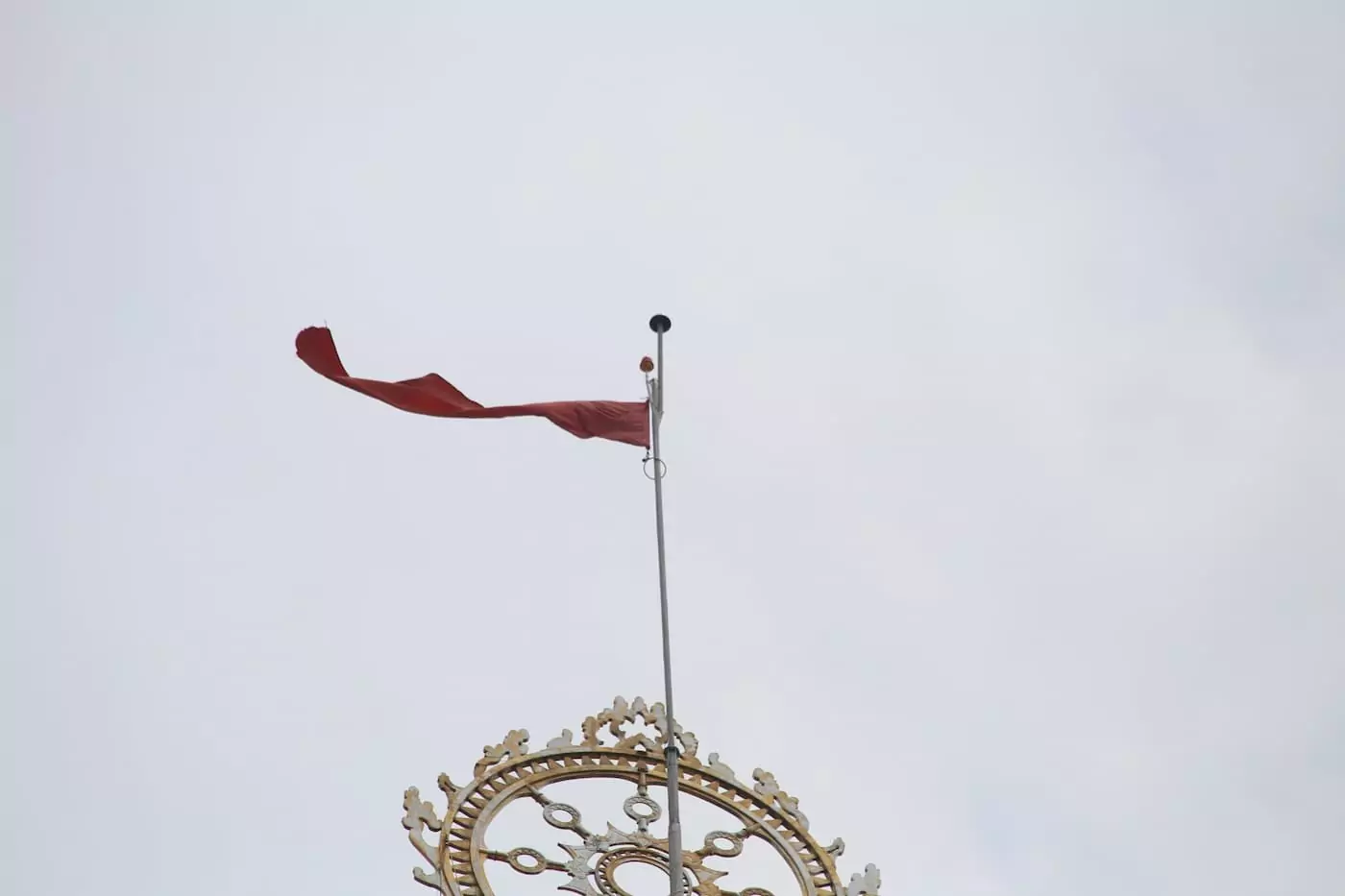
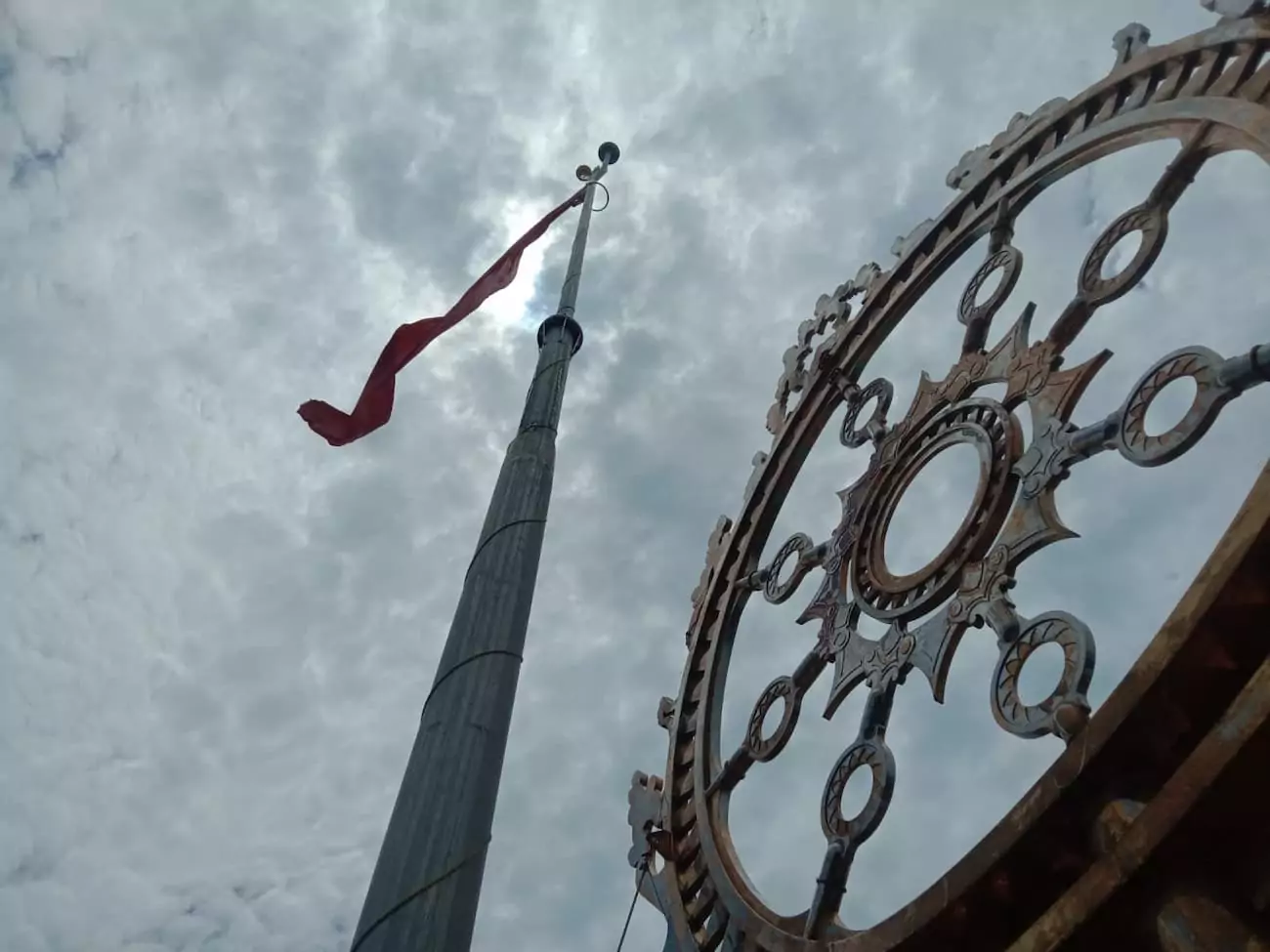
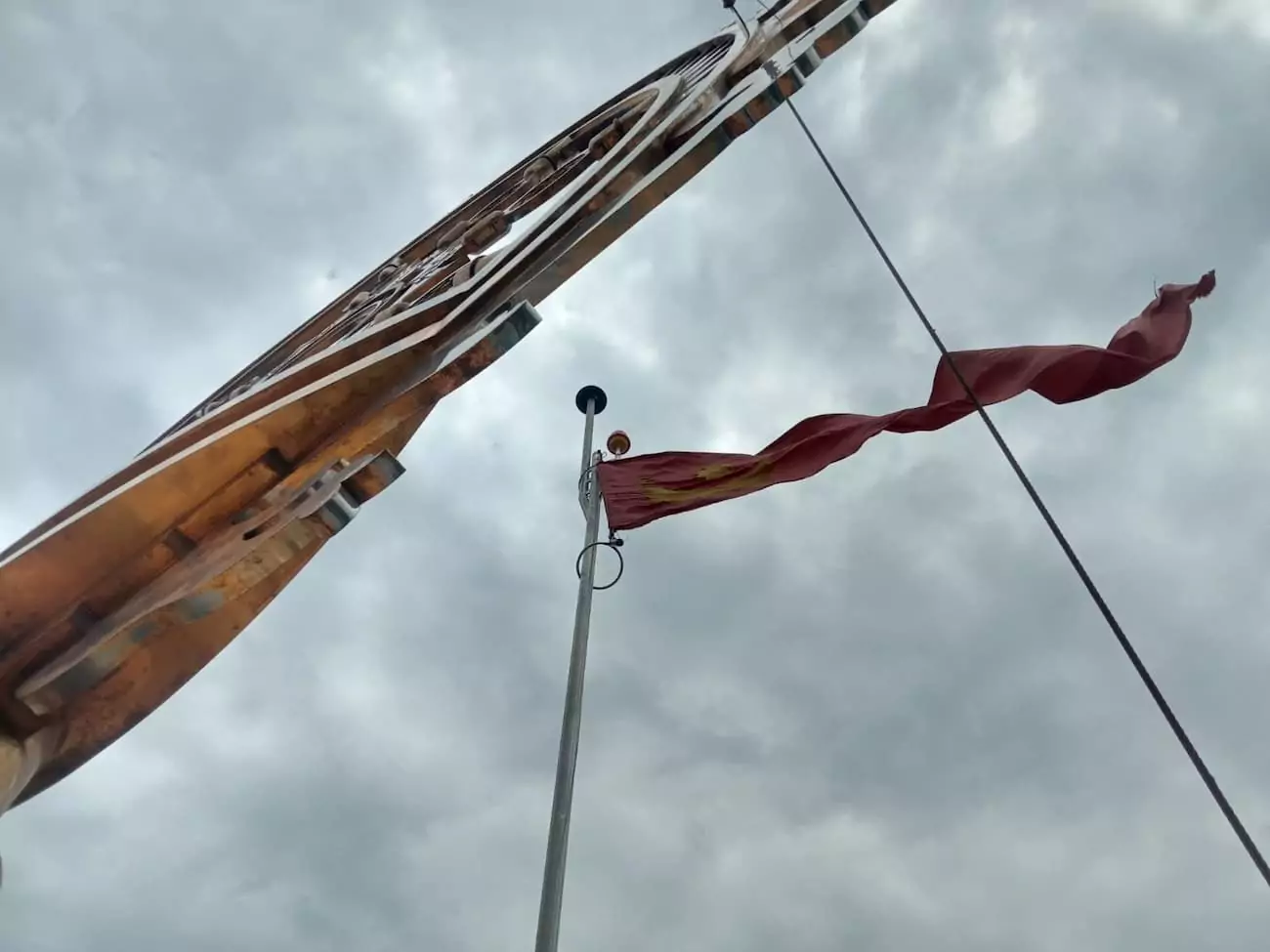
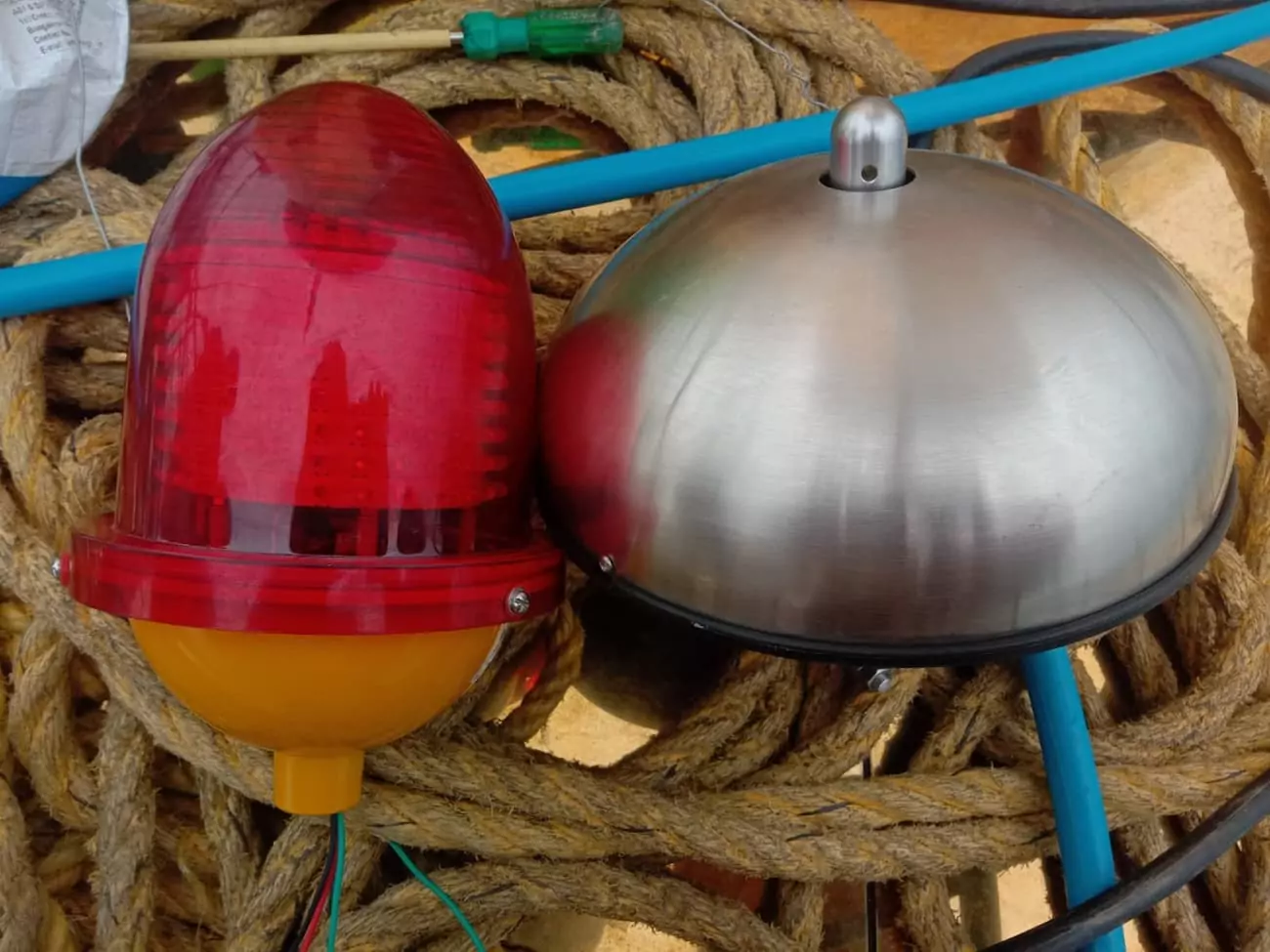
Visit: www.tovp.org
Support: https://tovp.org/donate/
Email: tovpinfo@gmail.com
Follow: www.facebook.com/tovp.mayapur
Watch: www.youtube.com/c/TOVPinfoTube
View at 360°: www.tovp360.org
Twitter: https://twitter.com/TOVP2022
Telegram: https://t.me/TOVP_GRAM
WhatsApp: https://chat.whatsapp.com/LQqFCRU5H1xJA5PV2hXKrA
Instagram: https://m.tovp.org/tovpinstagram
App: https://m.tovp.org/app
News & Texts: https://m.tovp.org/newstexts
RSS News Feed: https://tovp.org/rss2/
Store: https://tovp.org/tovp-gift-store/
𝗕𝗹𝗼𝗰𝗸 𝗬𝗼𝘂𝗿 𝗖𝗮𝗹𝗲𝗻𝗱𝗮𝗿! Tuesday, 12th of this month Sri Dham Mayapur will be hosting a very special Narasimhadev Abhishek, along with special prayers to the Lord. For the pleasure of Lord Narasimhadev and the persistent request from devotees and donors all around the world this facility has been made available and will continue to run […]
The post Special Monthly Sri Narasimhadeva Abhishek -12, 2022! appeared first on Mayapur.com.